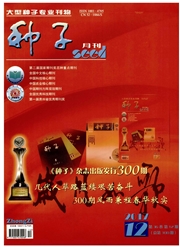

 中文摘要:
中文摘要:
采用浸种培养的方法,将人参根系分泌物组分为:苯甲酸、邻苯二甲酸二异丁酯、丁二酸二异丁酯、棕榈酸和2,2-二(4.羟基苯基)丙烷,稀释成1.00、0.10mg/L和0.01mg/L水溶液,在培养皿中培养人参种子特定时间后,测量种子胚根及胚轴长度,研究不同化感物质对人参种子萌发的自毒效应。研究发现,苯甲酸和2,2-二(4-羟基苯基)丙烷在1.00mg/L时对胚根生长有显著抑制作用,棕榈酸在该浓度对胚轴生长的抑制作用达极显著水平;邻苯二甲酸二异丁酯在0.10mg/L时对胚根生长表现轻微促进作用;除2,2-二(4-羟基苯基)丙烷外的4种物质在该浓度下对胚轴生长有抑制作用,苯甲酸和邻苯二甲酸二异丁酯在0.01mg/L时对胚轴生长表现轻微促进作用,棕榈酸和2,2-二(4-羟基苯基)丙烷表现轻微抑制作用。结果表明,根系分泌物的化感效应与化感物质的种类及浓度表现明显相关性,苯甲酸、2,2-二(4-羟基苯基)丙烷和棕榈酸对人参种子胚根或胚轴生长有较强化感效应。根系分泌物中酚酸和有机酸类化合物加速了人参连作障碍的形成。
 英文摘要:
英文摘要:
By seeds soaking cultivation method, aqueous solution containing 1.00 mg/L, 0.10 mg/L and 0.01 mg/L ginseng root exudates benzoic acid, diisobutyl succinate, 1,2-benzenedicarboxylic acid bis (2-methylpropyl) ester, palmitic acid and 2,2-bis (4-Hydroxyphenyl) propane respectively were used to cultivate ginseng seeds in petri dish. After a period of time, radicle and hypoeotyl length of ginseng seeds were measured to estimate the autotoxicity of allelochemicals on the germination of ginseng seeds. Results showed that, benzoic acid and 2,2-bis (4-Hydroxyphenyl) propane at 1.00 mg/L inhibited the growth of radicles significantly, palmitic acid inhibited the growth of hypocotyls very significantly. 1,2-benzenedicarboxylic acid bis (2-methylpropyl) ester accelerated the growth of radicles at 0.10 mg/L, and except for 2,2-bis (4-Hydroxyphenyl) propane, other four root exudates inhibited the growth of hypocotyls at the same concentration. Benzoic acid and i ,2-benzenedicarboxylie acid bis (2-methylpropyl) ester accelerated the growth of radicles at 0.01 mg/L, palmitic acid and 2, 2-bis (4-Hydroxyphenyl) propane showed inhibitory effects. Results indicated that autotoxicity of root exudates correlated to the chemical type and its concentration significantly, the autotoxicity of benzoic acid, 2,2-bis (4-Hydroxyphenyl) propane and palmitic acid on the growth of radicles or hypocotyls more stronger, which concluded that phenolic acids and organic acids which exudated by roots of ginseng accelerated the development of continuously cropping obstacle.
 同期刊论文项目
同期刊论文项目
 同项目期刊论文
同项目期刊论文
 期刊信息
期刊信息
